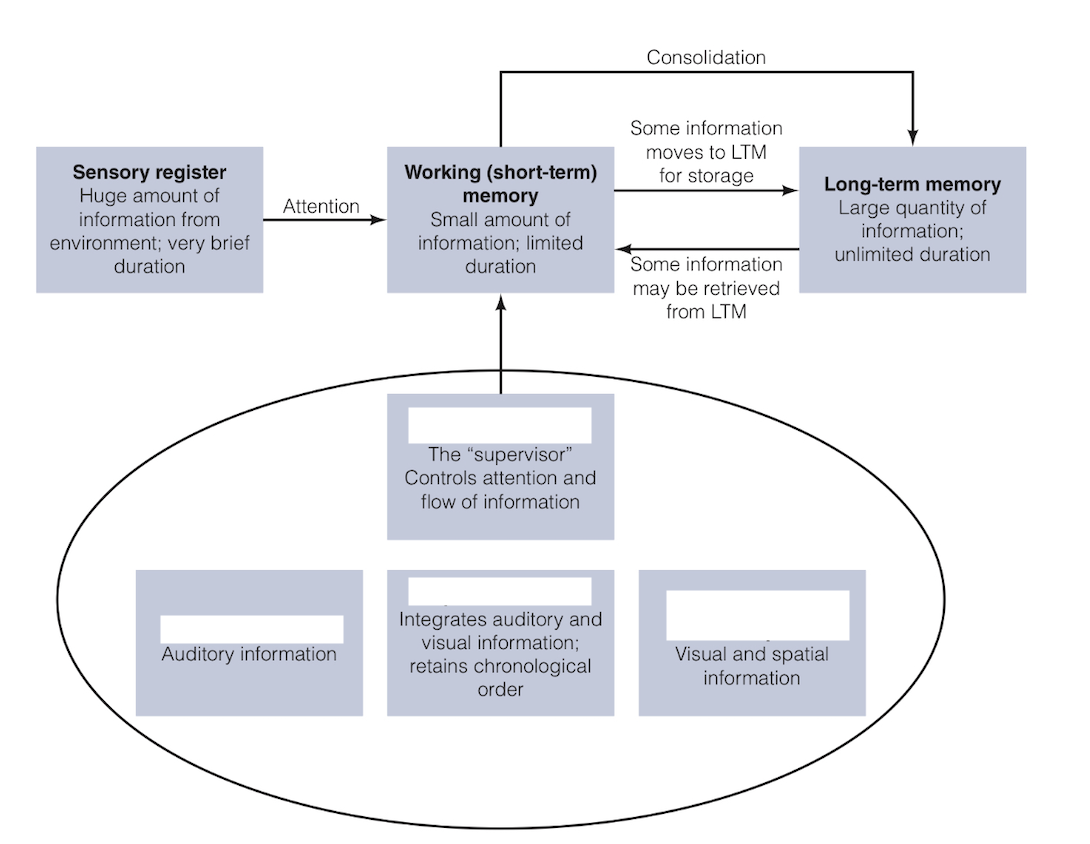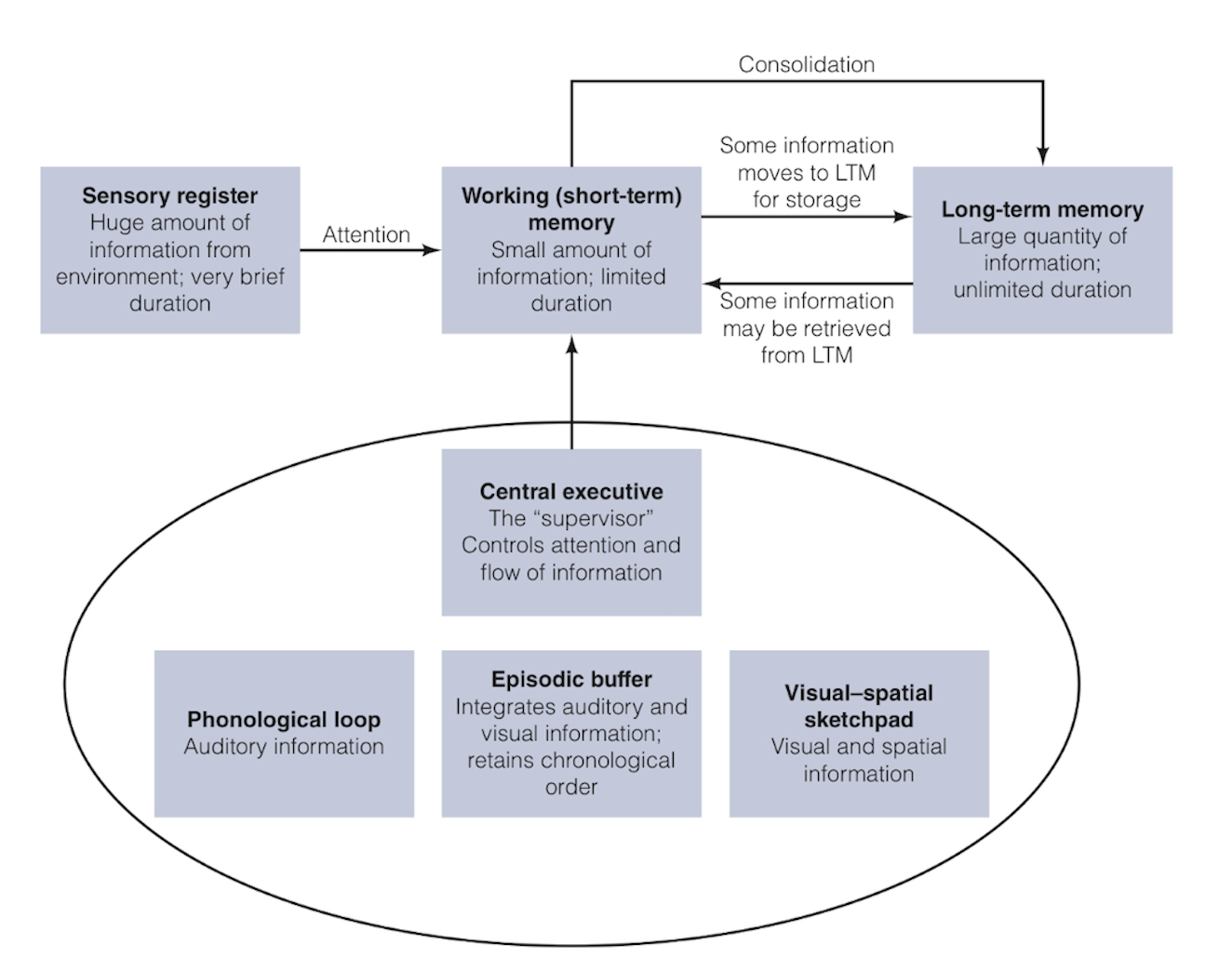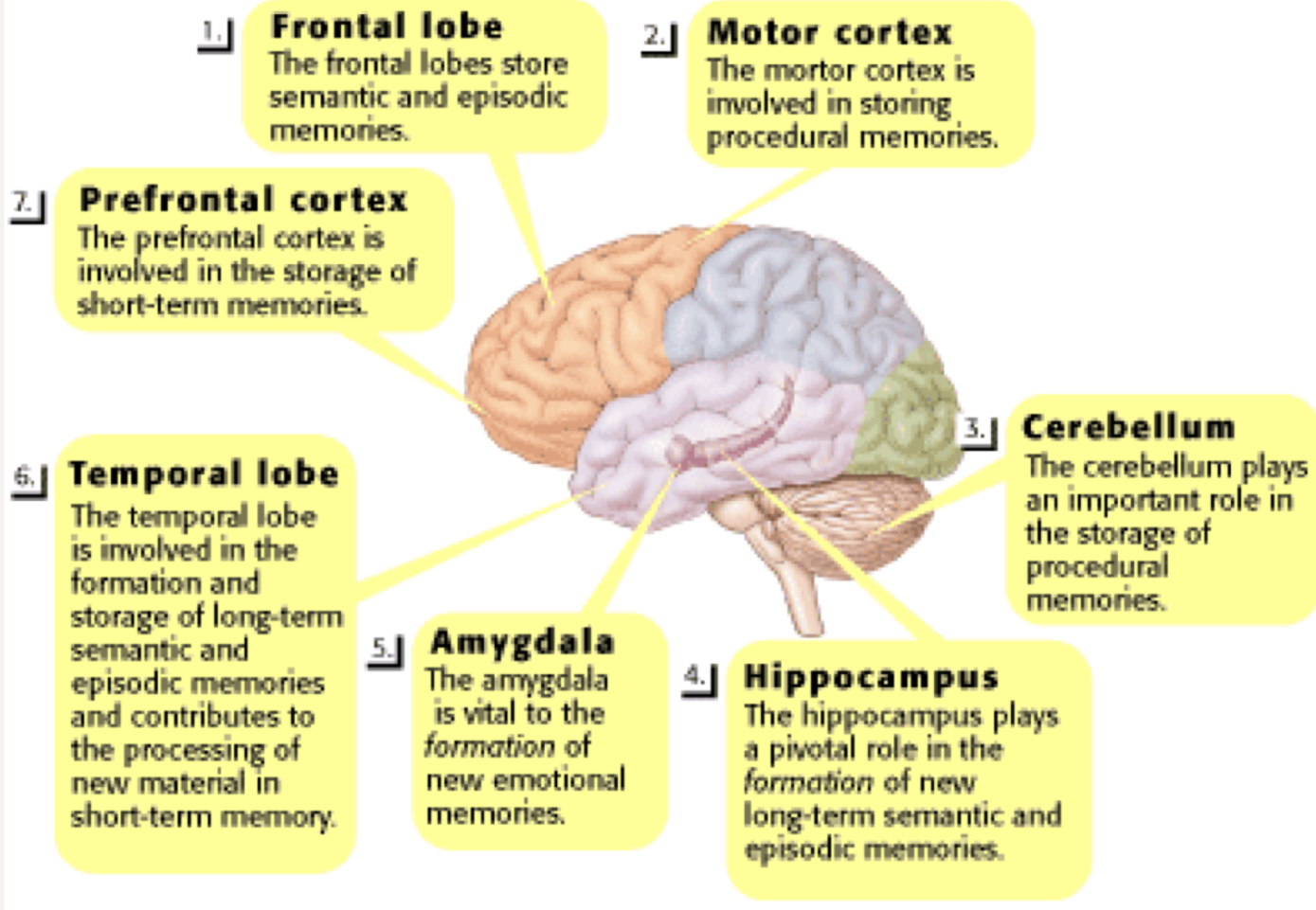5 Memory and information processing
1/25
Earn XP
Description and Tags
Ch 7
Name | Mastery | Learn | Test | Matching | Spaced |
|---|
No study sessions yet.
26 Terms
How can memory and learning be defined?
memory ⇒ ability to store and later retrieve information about past events, develops and changes over lifespan
learning ⇒ acquisition of knowledge and skills from experience/environment
State and explain the theory/approach that describes how human memory operates
Information processing theory
emphasises basic mental processes involved in attention memory perception decision making etc

Explain the model/framework for information processing by Atkinson and Shiffrin
model shows that info needs to be encoded into system and cannot be remembered if info is never encoded
info undergoes consolidation, a process that stabilises and organises new info to facilitate long term storage
info that moves to LTM for storage can fade without consolidation
retrieval (process of getting info when needed) can be accomplished in several ways

What are the two types of consolidation and what facilitates the process?
synaptic consolidation ⇒ occurs in minutes/hours of initial learning as synaptic networks are strengthened
system consolidation ⇒ takes place over longer period of time for info to be moved from hippocampus to LTM in other brain regions
facilitated by sleep, disrupted by stress
assisted when new material can be related with prior knowledge
spikes of neural activity during non REM sleep is correlated with greater retention of new learning that is associated with prior language
What are the ways retrieval can be accomplished?
recognition memory
recall memory (active retrieval)
cued recall memory

Explain the working memory model and how it fits into the information processing model
passive vs active short term memory distinguished
active STM = working memory
WMM fits into STM part of info processing model
real time processing, retention, and manipulation of info to achieve goals - temporarily stores info while actively operating with/on it

What are the two types of LTM?
Explicit (declarative) - involves deliberate, effortful recollection of events - conscious
semantic memory - general facts
episodic memory - specific experiences
Implicit (nondeclarative) - occurs unintentionally, automatically, without awareness - unconscious
skills, procedural tasks, habits, “muscle memory” (anterograde amnesia affects only explicit memory but implicit memory is intact)
priming (exposure to one stimulus influences response to another stimulus, without conscious guidance or intention)
classical conditioning, habituation
What are some of the neural bases/correlates of memory? State the region and its function
(* especially recall h________ and l__________ cortex)
hippocampus ⇒ damage results in loss of memory + inability to detect/retain patterns (statistical learning). instrumental in creating episodic memories + consolidation of info from STM to LTM. damage doesn’t affect short term visual memory however
limbic temporal cortex ⇒ vocabulary
entorhinal cortex in the temporal lobe ⇒ critical in connecting hippocampus to other brain regions (like stronger factor in amnesia)
striatum ⇒ mediates procedural memory
medial temporal brain ⇒ explicit memory localised

What are the two broad categories of learning?
explicit learning ⇒ consciously learned (e.g. rehearsing dates and factual info)
implicit learning ⇒ acquired through unconscious means (e.g. experience and associations)
Describe the three types of learning
classical conditioning ⇒ eliciting response through association with a stimulus
operant conditioning ⇒ association of action or behaviour with positive/negative reinforcement/punishment
observational learning ⇒ social cognitive theory, processing of info through vicarious experience/learning
How are infants’ memory assessed? (4 answers)
What type of memory does it show?
imitation
6 m/o displayed deferred (delayed) imitation
imitation of behaviour shows proof of retaining action in memory
↑ early form of explicit/declarative memory
infants remember best when given repeated exposure, cues to remember, & events occur in meaningful/logical order
habituation
learning to not respond to a stimulus (getting bored by the familiar)
proof of recognition memory as stimulus is familiar to infant
indicators: preferential looking time, physiological responses
operant conditioning
whether infants are deliberately/effortfully or unintentionally/automatically learning association of action and consequence
proof of implicit/procedural memory
memories are cue-dependent and context-specific at this stage
object search
A-not-B task
by 8 m/o children correctly choose (reach for) location B
suggested that 5-6 m/o show memory based on looking behaviour
What are autobiographical memories? What happens to them as a child grows up?
autobiographical memories ⇒ recall of episodic events
most experience childhood/infantile amnesia (few autobiographical memories from first 3-4 years of life is retained)
some college students able to recall memories as early as 2 y/o (lowest), but avg is 4~5 y/o
Why do we have little autobiographical memories of being infants/toddlers? (6 ans)
immature hippocampus and related memory structures ⇒ underdeveloped structures prevents consolidation to create LTM
neurogenesis in hippocampus “refreshes” memory store as new cells replace old cells
lack of language ⇒ autobiographical memory seems to rely on language skills
level of sociocultural support ⇒ mother-toddler conversation patterns (regular rehearsal)
sense of self ⇒ difficult to organise events (i.e. things that happened to me) without sense of self. ↑ knowledge of self would also ↑ autobiographical memories
verbatim vs gist storage ⇒ childhood amnesia explained in terms of fuzzy-trace theory (children store verbatim and general accounts at diff levels)
verbatim ⇒ word for word recall; unstable and likely to be lost over long periods
gist ⇒ recall of general points; easier to remember than details, takes less space in memories
Why do children learn faster and remember more than infants? (5 ans)
changes in basic capacities ⇒ better “hardware” due to brain development
improvement in encoding/consolidation NOT actual memory capacity
changes in memory strategies ⇒ better “software” due to learning/applying effectively methods for memorising
older children use more effective strategies
increased knowledge of memory ⇒ stronger central executive, can direct attention & memory, better understanding of how memory works
good metamemory can help children choose appropriate strategies
increased knowledge of the world ⇒ easier to use familiar material to memorise as world around becomes more familiar
richer knowledge base allows faster and more efficient processing of info
increased use and accuracy of memory scripts ⇒ accurate scripts about events, helps with recall of events
What accounts for developmental differences in memory?
not actual basic storage capacity of LTM as it is suggested to not change much across lifespan
encoding and consolidation processes develop instead ⇒ both show improvement over the course of infancy
encoding improves as prefrontal cortex and medial temporal lobes mature
consolidation improves as hippocampus matures
speed of mental processes also improve due to myelination of neurons
as basic mental processes become automatic, they are performed with little effort, freeing space (cognitive load, working memory) for other operations
sum: basic capacities actually do not change, but other factors influencing efficiency and speed do
What cognitive aspect accounts for improvement in memory?
memory (encoding & retrieving) strategies (used more when goal is personally relevant)
e.g. using external/behavioural memory aids, rehearsal (repetition), organisation (categorisation into meaningful groups, such as chunking, elaboration (creating meaningful links between items) - (strategies develop in that ↑ order)
younger children (less than 4 y/o) tend to make preservation errors (using same strategy that was successful in the past despite not working currently)
retrieval strategies can influence how much is recalled
What is meant by “knowledge of memory”?
metamemory ⇒ knowledge and control of own memory; an aspect of metacognition
findings indicate metacognitive awareness is present from 2~4 but gradually improve throughout childhood
influenced by language skills, general knowledge about mental states and roles in behaviour (ToM)
How exactly does an increased knowledge about the world improve memory skills?
knowledge base affects learning and memory performance
familiarity/prior storage of knowledge can make encoding new info that is similar easier
What is meant by “memory scripts” and how does it help with memorisation?
scripts / general event representations ⇒ typical sequence of actions related to certain scenario/event, guides future behaviours in similar settings
scripts become more detailed + richer
scripts affect how children form memories of new experiences + recall past events
if info is inconsistent, children might misremember info to fit into script (has implications for eyewitness testimony)
Explain how children use memory for problem solving
Siegler’s adaptive strategy choice model ⇒ children have multiple strategies in toolbox which they select from based on task, motivation, & comfort level
familiarity with a task and strategies frees processing space (mental capacity/cognitive load); allows for children to engage in metacognitive analysis of strategies
Describe the developments in learning and memory strategies for adolescents
new strategies emerge, strategies are advanced, elaboration mastered, deliberate usage
working memory has greater functional & expanded use
basic capacities continue to develop and increase
Describe changes in metamemory and knowledge base in adolescents
K.B. continues to expand
metamemory and metacognition improve ⇒ increased monitoring of memory, adjusting strategies
linked to development in frontal cortex
varies by gender and SES
Describe the strengths and weaknesses in areas of memory for adults
declines do not become noticeable until 70s, not all elderly people experience this
often struggle w memory tasks that are timed, but little/no deficits shown when not timed (cognitively demanding)
large gap between recognition and recall capabilities - indicates cues needed to retrieve info (recall vs recognition)
older adults have more problem with explicit memory tasks that require mental effort than implicit memory tasks that are automatic (explicit vs implicit)
learning unfamiliar material and using unexercised abilities also make tasks more difficult
What factors can account for declines in old age?
knowledge base ⇒ knowledge and expertise continues to increase over years and is retained well (verbal knowledge, vocabulary, languages)
gains in knowledge help elders compensate for losses in information processing efficiency
metamemory ⇒ monitoring memory to assist in learning
memory loss contribute to drop in confidence and memory skills
memory strategies ⇒ less spontaneous use of strategies
adults show improved memory performance when prompted to use strategies
basic processing capabilities ⇒ declines in sensory abilities, memory deficits, working memory capacity diminishing
autobiographical memory rises in 20-30s, dips, then rises again after 50s
personal significance, distinctiveness, emotional intensity, life phase of event
older adults learn new material more slowly
contextual contributors ⇒ memory is product of interaction between characteristics of the learner, task/situation, broader env (cultural context)
What problem solving strategy do adults use that rules out items?
constraint seeking questions
when task is more familiar, older adults do better
unfamiliar context and setting (laboratory) may inhibit older adults from using effective problem solving strategies
How do older adults compensate for diminishing cognitive resources?
Selective optimisation with compensation
three processes: selection (focus on a limited set of goals and skills needed to achieve), optimisation (practicing skills), compensation (developing ways around need for other skills)
middle aged and older adults tae advantage of SOC - used to help overcome weaknesses in explicit memory, patients with dementia due to AD